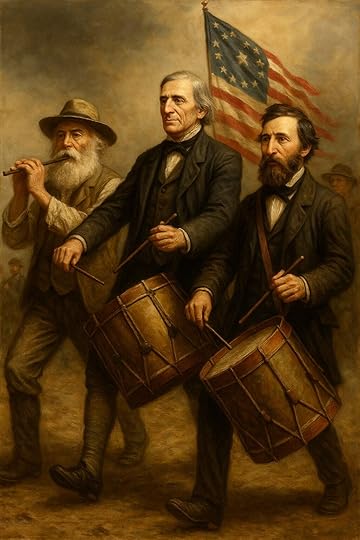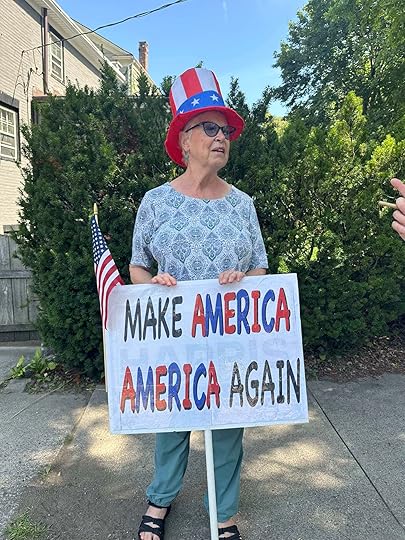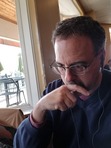Camerado, I give you my hand

Regardless of your political affiliation, “Make America Great Again” is an absurd concept. At any given point in our history, we’ve been good in some areas, mediocre in other areas, and appalling in a few spots. That’s just reality. It will probably continue to be our reality for as long as we have a country.
I know there are some people who would prefer not to talk about anything appalling in our history or allow anyone else to talk about it. Those people are cowards, as far as I’m concerned, and the exact opposite of patriots. You can’t make your country better—any more than you can make yourself better—if you’re afraid to look in the mirror and account honestly for what you see there.
But “honestly” doesn’t have to mean singularly or exclusively critical or negative. I believe in what Bill Clinton once said—that there’s nothing wrong with our country that can’t be fixed by what’s right with our country. And maybe we need to be a little more embracing of each other and a little less constantly on the warpath against each other. Maybe we need to retire our inner Karens, stop complaining to the manager about every single thing that isn’t being served up to us exactly how we want it, and get back in touch with the grander American soul that Walt Whitman first defined for us.
Whitman and Us“I am large; I contain multitudes.”
If you know any line of Walt Whitman’s, you probably know that one. It’s part of a breathtakingly brash and egotistical poem that announced his presence in American letters, claiming that he was the entire country and the entire country was him, and he was here to say Yes to it all in all of its crazy-quilt complexity.
Walt Whitman knew a thing or two. America is not just the descendants of the Mayflower Compact signers, or the Daughters of the American Revolution, or the Daughters of the Confederacy, no matter what people like JD Vance want to believe. That may be what people in 1620 wanted Plymouth to be. It may even be what people in 1776 or 1789 wanted the country to be. But too bad for them; they wrote what they wrote, and they started what they started, and Lady Liberty lifted her lamp beside the golden door. And here we are.
Even before the influx of immigrants and the freeing of the enslaved, there were Americans who understood their nation as a reaching-out place more than a turning-inward place. The generation born after the Revolution grew up in a different world than their ancestors, or even their parents—they grew up inside the United States, and as Clay Shirky taught us about the Internet, those who grow up inside a new technology understand it far differently from those who adopt it as teenagers or adults.
Among the first generations to be born inside the United States, we got writers like Ralph Waldo Emerson, Henry David Thoreau, Louisa May Alcott, Mark Twain, Edgar Allan Poe, and Walt Whitman. Those writers, more than any others I know, defined what it meant to be American. The founding generation invented the political structure; these generations invented the culture and the personality traits that future generations took for granted.
Whitman, born in New Jersey in 1819, wrote only a single volume of poetry, but he revised it and added to it throughout his lifetime, and he often talked about his book, Leaves of Grass, as though it were his body, or even his country.
Whitman was not a recluse or a philosopher. His poetry wasn’t precious or intricate. He knew he was part of a big, giant, baby of a country, and he wanted to wrap his arms around all of it, in reality and his poetry. His poems were often long lists of people—all kinds of people, doing all kinds of jobs, in all kinds of places. And his book is a series of explorations and celebrations of his country and its people.
Born here of parents born here from parents the same, and their parents the same,
I, now thirty-seven years old in perfect health begin,
Hoping to cease not till death.
“Allons!” he called to his readers. “The road is before us!”
If the road trip is the quintessentially American story, then Whitman, followed by Twain, invented that story for us.
Camerado, I give you my hand!
I give you my love more precious than money,
I give you myself before preaching or law;
Will you give me yourself? will you come travel with me?
Shall we stick by each other as long as we live?
He didn’t want to sit in dark rooms and brood. He wanted to get outside and breathe fresh air and live. He wanted to go everywhere and meet everyone. His poems are catalogues of people making and doing things. Whitman embraced the differences and marveled at the diversity he saw around him. He didn’t sugar-coat or ignore what was violent or painful. He knew war and he knew peace. He knew love and he knew hatred. He invented a new, American poetry that was muscular and athletic and energetic. He sounded a barbaric “yawp” over the roofs of the world.
Whitman and MeCreeds and schools in abeyance,
Retiring back a while sufficed at what they are, but never forgotten,
I harbor for good or bad, I permit to speak at every hazard,
Nature without check with original energy.
Maybe I admire this guy and his poetic life-force because I always felt like I lacked it. I was not the kind of person who knew how to respond to Whitmanesque invitations. I could perform on stage in plays, but I couldn’t talk to people at parties. I could go all night at a bar or a diner with three friends, but in a big room, filled with strangers? Hopeless. I was the guy hugging the wall, the guy who hung around for a miserable hour and then disappeared without telling anyone. I was the guy who cringed at the idea of “networking” or “schmoozing.” I did sit in dark rooms and brood.
But then I had kids. Two kids. One who was more of an introvert, who tensed up when another kid from his class waved at him from across a field, and one who was a social butterfly, chatting up everyone (mostly women), complimenting them on their hair or their nails, asking them where they got the necklace they were wearing, engaging with them with genuine affection and curiosity. And it was amazing to see how people lit up whenever that kid spoke with them—how seen and appreciated they felt in that moment, just in response to the slightest kindness and curiosity. And it made me remember something from an old movie.
The movie is Harold and Maude, one of my favorite weird, indie, 1970s movies, about an outgoing, life-affirming old woman and her relationship with a depressive, morose young man.
In the scene I thought about while watching my kid (which I can’t find on YouTube to share), Harold compliments Maude on how well she gets along with people. Maude shrugs and says, “Well…they’re my species.”
That line always hit me in the gut. Because they were my species, too, and what was I doing to get out among them and know them? Very little.
Maude, it turns out, is a Holocaust survivor—another tidbit that hits one in the gut. Because if she can find a way to say Yes to life and people, then what’s our problem?
I made a promise to myself to do better—to engage more, to ask more, to have fewer purely transactional relationships with the people I encountered. I ask about people more now—anyone I meet. I look them in the eye more. I let them know I see them and that I’m curious about them.
It changes everything.
That’s probably not a revelation to you, but it was to me. And I’m glad I was able to learn from my children and grow a little bit as an adult.
Social Media isn’t SocialGetting out into the actual world is not the same thing as texting friends or surfing the Internet. It’s easy to forget that, but I can see some of the Gen-Z kids, including my own, figuring things out and taking steps to fight against the so-called social media world that they’ve inherited. They see what it’s done to Millennials, Gen-Xers, and Boomers, and a lot of them don’t like what they see.
What does social media do? It identifies and defines us based on whatever we bring to it, and then it feeds our opinions back to us in an endless feedback loop that enhances and deepens and calcifies our views to an extent that becomes increasingly difficult to break free of. That’s not social. It’s solipsistic.
The remedy is obvious, even if it’s not easy. The remedy is to turn off the computer, leave your phone and your convictions at home, and set out, like Whitman, to encounter people as they are, wherever they are—to ask about them rather than decide about them—to be “curious, not judgmental” (as Whitman appears not to have said, despite what Ted Lasso thought). To be among the people, and with the people, and to find something to appreciate about them, whatever they may be.
That’s not an easy ask for some of us. It’s not an easy ask for me, sometimes. But I’m trying to do better. Because I know that the more I ask and listen, the less alien other people seem.
I am with you, you men and women of a generation, or ever so many generations hence,
Just as you feel when you look on the river and sky, so I felt,
Just as any of you is one of a living crowd, I was one of a crowd,
Just as you are refresh’d by the gladness of the river and the bright flow, I was refresh’d,
Just as you stand and lean on the rail, yet hurry with the swift current, I stood yet was hurried,
Just as you look on the numberless masts of ships and the thick-stemm’d pipes of steamboats, I look’d.
I don’t expect everyone I meet to think the same way I do, or feel the same things that I feel, or agree with my beliefs and opinions. But I know that it’s better to ask about people than make assumptions about them. And I know that it’s better to listen, and learn, and understand people who think differently than to presume and condemn without listening. Even if it’s hard to do. Maybe especially then.
If we want to make America great, we need to get outside of our bubbles and see what America is—and find a way to say Yes to it, in all of its complexity and rawness and weirdness, regardless of what color its skin is, or what clothes it wears, or what language it grew up speaking, or who it wants to love. We need to stop hugging the walls of our biases and preconceptions and get out into the party and mix.
We are large; we contain multitudes. We should start acting like it.

Scenes from a Broken Hand
- Andrew Ordover's profile
- 44 followers



